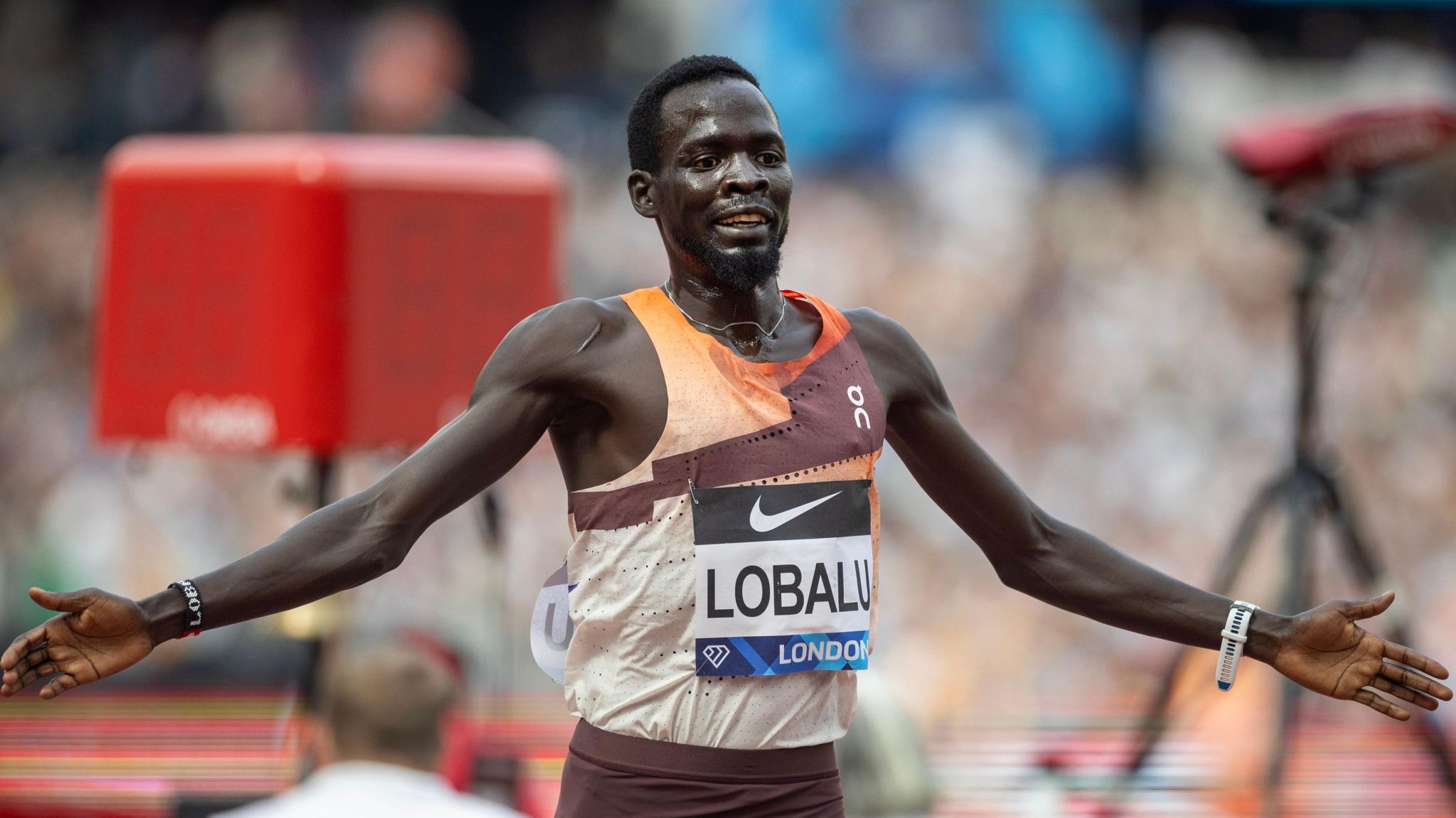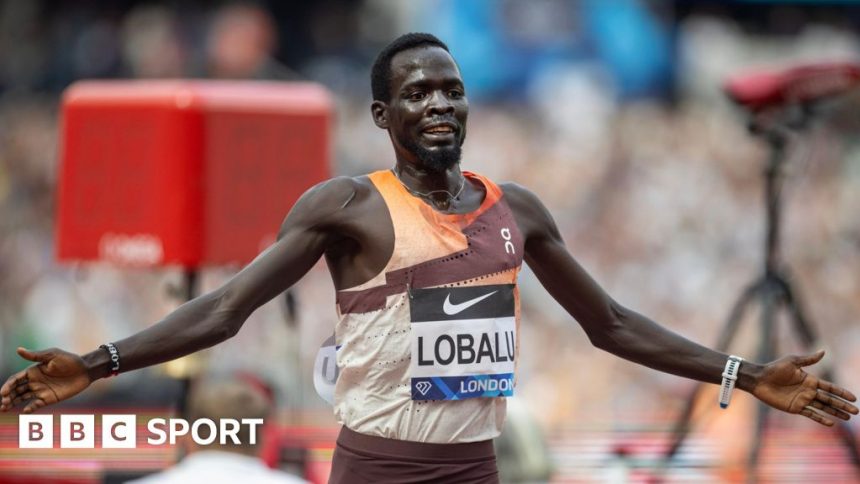The orphaned refugee planning to make Olympic history

Dominic Lobalu, who grew up an orphan in a refugee camp in Kenya, will compete in the 5,000m at the Paris Olympics
-
Published
Two months ago Dominic Lobalu thought he would not be able to compete at Paris 2024, but now he has the chance to make history.
The 25-year-old was ruled out of the Tokyo 2020 Games after claiming asylum in Switzerland, making him ineligible to compete for refugee teams.
After being given clearance by World Athletics to represent his adopted nation in May – despite not holding Swiss citizenship – Lobalu won two medals at the the European Championships the following month.
His gold in the 10,000m and bronze in the 5,000m persuaded the International Olympic Committee (IOC) to invite Lobalu to join its Refugee Olympic Team, and the South Sudanese-born runner will compete over the shorter distance in the French capital.
“This is what I was dreaming for,” Lobalu told BBC Sport Africa.
“When I started my training, the goal was to go to the Olympics one day. And now I have it I’m so happy.”
Boxer Cindy Ngamba has already assured the Refugee Olympic Team of its first ever medal, but Lobalu could upgrade her guaranteed bronze.
The first round of the 5,000m begins on Wednesday, but it has been a long journey for Lobalu to reach the start line.
It is one that began in Sudan and has taken detours via Kenya and Switzerland.
Fleeing South Sudan
In 1998, Lobalu was born into a country in the middle of a long-running civil war.
He grew up in Chukudum, a small village in south-east Sudan which would become part of South Sudan when it gained independence in 2011.
The conflict, which ended in 2005, is estimated to have killed two million people.
But two years after the war Lobalu’s home village was raided by soldiers. The family fled but he was separated from his parents.
He wound up in an orphanage and then, at the age of nine, made it across the border to Kenya with the help of an Italian NGO.
The Kakuma Refugee Camp, a sprawling settlement in north-west Kenya run by the UNHCR, became his new home.
Kakuma Refugee Camp was established in 1992
Now living in Switzerland, Lobalu is reluctant to talk in depth about his past before a competition, preferring to focus on the future.
However, he admits his experiences at the camp motivate him on the track.
“I don’t want to go back to that life,” he said.
“The life that I [had] there is more painful than the running.
“Where I came from, you don’t know if you’re eating tomorrow. You don’t have a guarantee that you will get food.”
Lobalu’s two older sisters still live in Kakuma, and he dreams of one day helping them leave.
“They are fighting a lot in Kakuma so they don’t sleep enough,” he said.
“They’re scared at night. Sometimes they go to the hospital, they sleep there because they are scared.”
The start of an Olympic dream
Lobalu’s Olympic dream began in 2012 when he watched Mo Farah win 10,000m gold at the London Games.
However, it was not necessarily Farah’s performance that inspired him.
“The way they were running, it looked too slow on the TV,” he said.
“[I] was like, ‘Wow, if I could have been [there] I could’ve won.’”
In 2015, Lobalu competed barefoot in a 10km race at the Kakuma camp which was organised by famed Kenyan runner Tegla Loroupe.
The teenager finished second and Loroupe, a two-time winner of the New York Marathon, invited Lobalu to join a training camp at her foundation on the outskirts of Nairobi.
The Tegla Loroupe Peace Foundation on the outskirts of Nairobi has provided athletes to refugee teams since 2016
Two years later, just shy of his 19th birthday, Lobalu competed in the heats of the 1500m at the 2017 World Championships in London – in the same stadium where Farah won Olympic gold five years earlier.
Featuring at the 2020 Tokyo Olympics appeared to be an attainable goal, until his time with the Athlete Refugee Team came to an abrupt end.
Seeking Swiss asylum
In 2019, Lobalu travelled to Geneva to compete in a 10km race.
After his victory he snuck out of the team’s hotel and decided he would stay in Switzerland, no matter the consequences.
Penniless, he applied for asylum at a Swiss refugee centre where an immigration officer connected him with coach Markus Hagmann, who consequently invited him to train in St Gallen.
Lobalu won the first race in Switzerland Hagmann could find, and he continued winning.
But that would not be enough to compete in Japan.
-
-
Published2 May
-
-
-
Published7 days ago
-
In July 2021, in the lead up to the delayed Tokyo 2020 Games, the IOC and the United Nations Human Rights Council ruled that Lobalu could not represent the Refugee Olympic Team.
But in June the following year Lobalu was granted a short-term residency permit in Switzerland, allowing him to travel outside of the country and compete.
At the end of that month, guided by coach Hagmann, Lobalu had a breakthrough performance at his first ever Diamond League meeting – beating half marathon world champion Jacob Kiplimo to win the 3000m in Stockholm.
Lobalu won gold in the 10,000m at the European Championships in Rome on 12 June
Lobalu is not eligible to apply for Swiss citizenship until 2031, but in September last year World Athletics granted him permission to race for his adopted country from April 2026.
That date was subsequently brought forward to May this year, allowing him to appear at the European Championships in Rome and become the first refugee to win a medal at a major international event.
“It feels amazing,” Lobalu said.
“When I was young, I didn’t know that I can have something like this. But after two medals I think it’s just the beginning.”
Refugee Team recall
Yet, six weeks before the Paris Games, the IOC declined to allow Lobalu to compete for Switzerland.
“He is not currently a Swiss national, which the Olympic Charter would require,” an IOC statement said.
However, the day after Lobalu became European champion, the IOC invited him to compete in the 5,000m in the French capital for the Refugee Olympic Team.
A long-time admirer of Olympic athletics, Lobalu believes Wednesday’s heat at the Stade de France will be more difficult than the final.
“For the heat we have the slowest guys,” he explained.
“They have never had international races, so it’s easier for you to fall down because they don’t follow the line.
“If you try to approach them, if you want to move out, they don’t allow you so they just block.”
On Thursday, two days before the men’s 5,000m final, Swiss sportswear brand On will release a short film documenting Lobalu’s journey entitled ‘To Chase a Dream’.
“I enjoyed participating in the production and I hope it inspires other refugee athletes to never give up on their dreams of becoming the best.“
And he already has his sights on the next chapter – standing on top of the podium with a gold medal in Paris.
“Why not?” he said.
“I’m ready for anything.”





